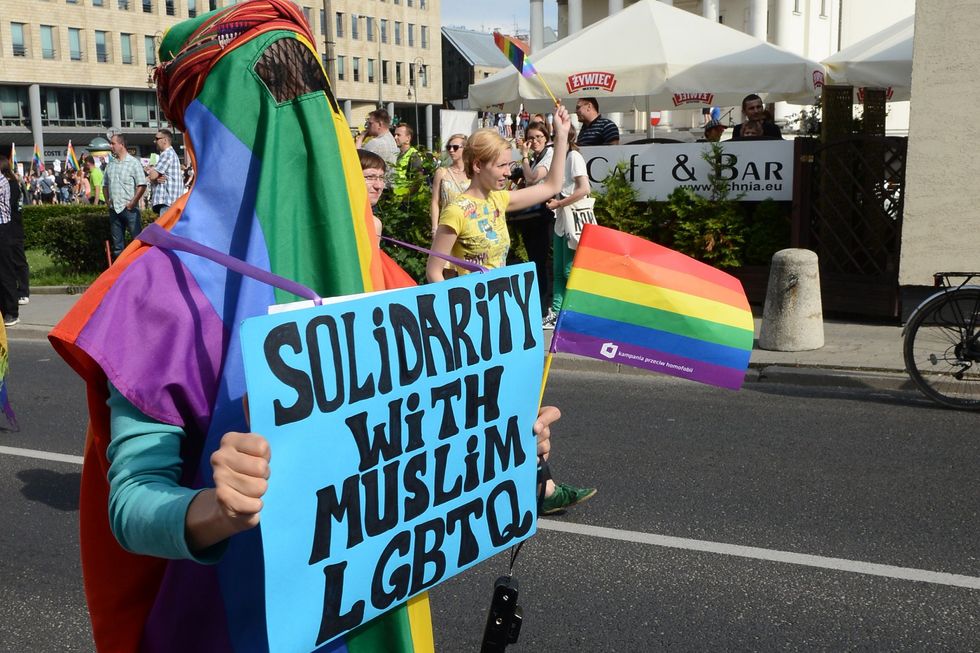The subject of LGBTQ+ presence in Muslim communities is an incredibly complex issue and one that is still studied extensively by Islamic scholars around the world. There is a widely held belief that Islam has no space for its LGBTQ+ Muslims, or that these individuals are forever persecuted by a religion that abhors their very existence. To assume these things is to do so from a place of ignorance and prejudice. Here are a few things that everyone, Muslim or not, should consider or learn about in regards to sexuality and Islam.
The Quran Doesn’t Condemn Homosexuality
The Quran does not explicitly mention the word homosexuality (as sexuality is a modern concept), but does acknowledge sexual diversity (Surah Al-Nur 24:31-24:33) without condemning it. Therefore, citing the Quran to argue that homosexuality is “unnatural” is not actually based on anything within the scripture, and is an idea that was actually first introduced by European Christians.
What about the story of Lut (or as he’s referred to in the Bible, Lot)? All three Abrahamic religions mention this story and followers have referenced this example of divine retribution to justify anti-LGBTQ+ rhetoric. Yet, Islamic scholars have found that the story of Lut and the people of Sodom is one that condemns greed and rape, while promoting the value of hospitality and kindness (here is an excellent resource to further elaborate on this interpretation).
Along with the Quran, Muslims often turn to the life lessons and stories (Hadith) about the Prophet Muhammad (PBUH) for guidance on how to lead fulfilling lives and to discuss issues like homosexuality and faith with historical context. However, there is no record of the Prophet discriminating or condemning sexual diversity, nor is there any indication of the Prophet describing homosexuality as a crime to be punished for (a common misconception that many have about Shariah, which is just a set of moral and ethical guidelines within Islam).
Homophobia is Man-Made, Not a Divine Commandment
Now, I’m not going to lie and say that all the evidence stated above completely eradicates any and all homophobic sentiment within Muslim communities. It should, but that’s not the case.
There are a number of contributing factors that play a role into the presence of homophobia within Islamic communities. There is personal prejudice stemming from a place of fear or ignorance, or even a lack of personal interaction with any LGBTQ+ Muslims. Not to mention, skewed interpretations of the Quran or Shariah and the refusal to move away from what early Islamic scholars spoke of on the topic that also play a role.
Adhering to archaic teachings of the past in modern society is to do so without regarding historical context. Families, faith leaders and authoritarian governments cherry pick verses or ideas and force them down the throats of an impressionable audience, nurturing a society of bigotry and discrimination that seems almost intrinsic- it’s not. It’s learned behavior, toxic and festering.
To claim religious justification for the discrimination or persecution of diversity is not an expression of faith, its blasphemy.
LGBTQ+ Muslims Aren’t Going Anywhere
Faith and discussions of faith are constantly evolving. Queer Muslims have always been a part of the ummah (community of followers of Islam). Their visibility is something that has yet to be acknowledged by members within our faith as well as those outside of it.
To my non-Muslim readers: Do your best to understand and learn more about Islam as a whole, and educate yourself on the intersectionality within both Islam’s many sects/spheres of belief, as well as within the queer Muslim community.
To my fellow Muslim brothers and sisters: Embrace your LGBTQ+ Muslims for who they are. If they’re able to marry their faith, sexuality or gender identity without conflict, why can’t you?
Islam celebrates diversity, whether it is referring to religion or sexuality. The core values of Islam and the principles of Shariah look to uphold justice, civil liberties, kindness and human rights. Public speaker and community organizer Mahdia Lynn writes that, “The Prophet Muhammad (PBUH) said: "Whoever Follows a Path in the pursuit of knowledge Allah will make a path to Jannah easy for them— consider, how can this tradition remain true to itself while enacting bigotry and exclusion at the same time?”
LGBTQ+ Muslims exist. They always have, and they’re not going anywhere.



















